#book-of-revelation
Link
In the Book of Revelaton the Time of God's Wrath had come. As the visions unfold, the seventh angel sounds the trumpet which completes the mystery of God. Further, it fulfills all things spoken by the mouth of the prophets.
Revelation 11:15-18 is a much underrated text and deserves more attention. Listen, Learn and Share.
Subscribe and Receive FREE Video Lessons To Your Inbox
#apocalypse#book-of-revelation#end-of-the-world#endtimes#judgment#last-days#rapture#the-wrath-of-god
0 notes
Text
Crazy to think that there were 15 seasons of Supernatural and Jesus wasn’t like a Thing. Never mentioned. They decanonized Jesus Christ
2K notes
·
View notes
Text
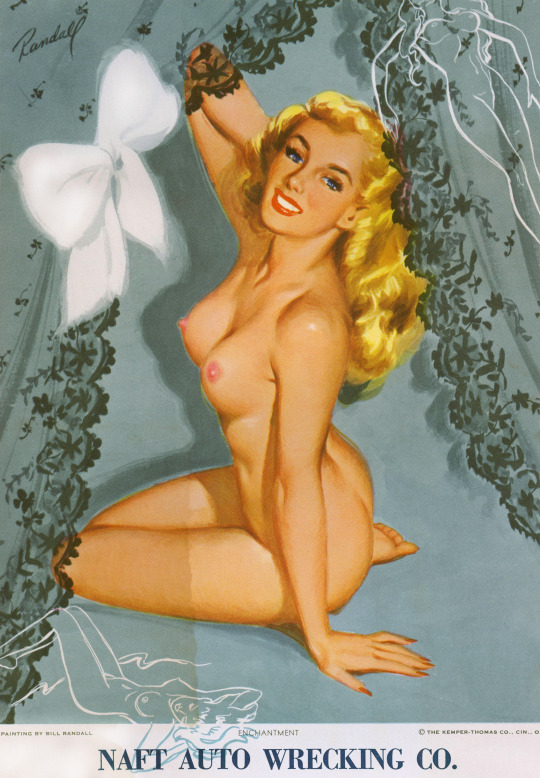
Bill Randall - "Enchantment"- December 1951 Revelations Date Book Calendar Illustration - Kemper-Thomas Calendar Co. - American Pin-up Calendar Collection
#bill randall#december#1951#Revelations#date book#calendar#illustration#kemper thomas#pin up#american pin up
440 notes
·
View notes
Text

The Vision of Death by Gustave Doré
#gustave doré#art#death#pale horse#biblical#bible#la grande bible de tours#new testament#christianity#christian#apocalypse#apocalyptic#thanatos#earth#hell#hades#beasts#demons#grim reaper#religion#religious art#romanticism#fourth horsemen#book of revelation#four horsemen of the apocalypse#bats#bat wings#demon#horse
241 notes
·
View notes
Text
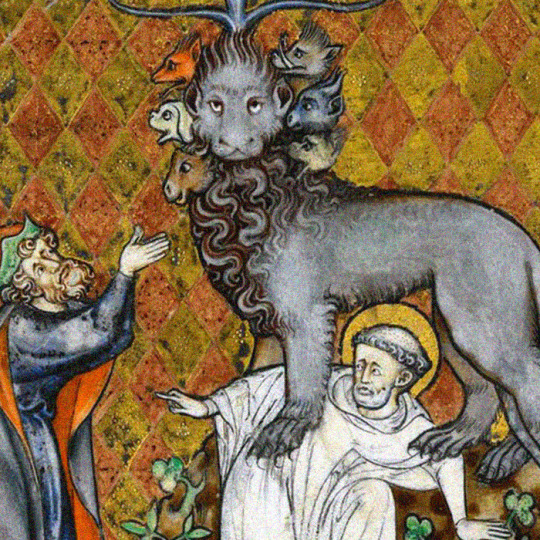
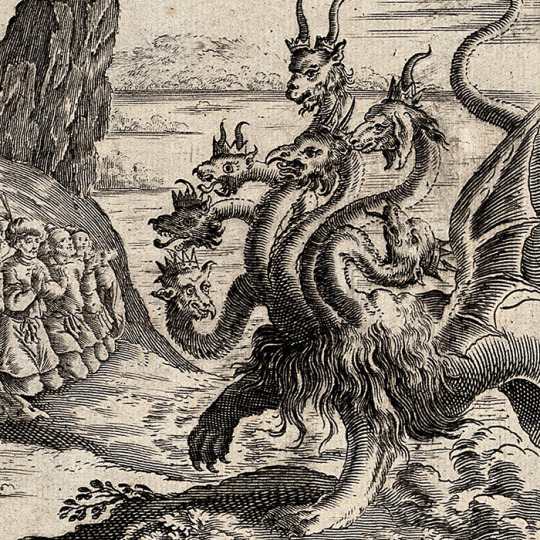
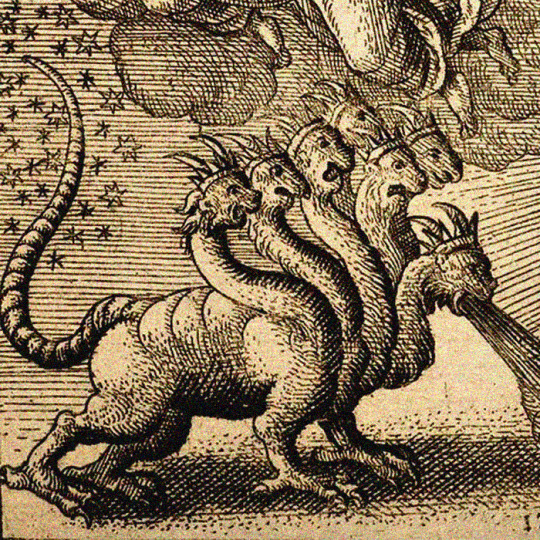
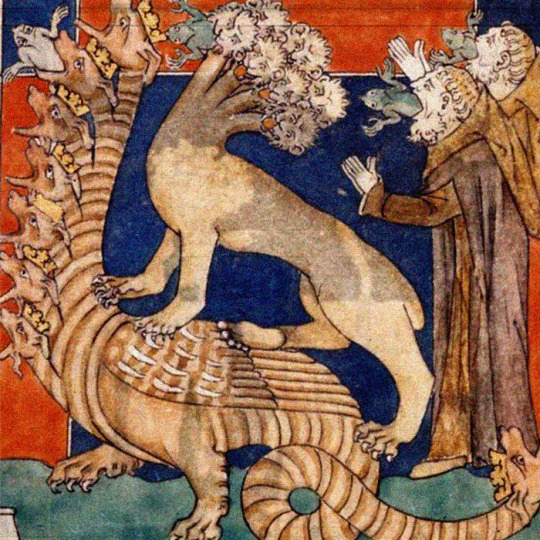
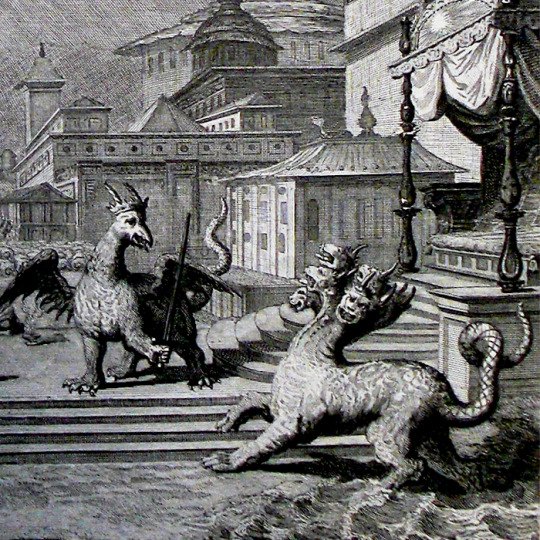
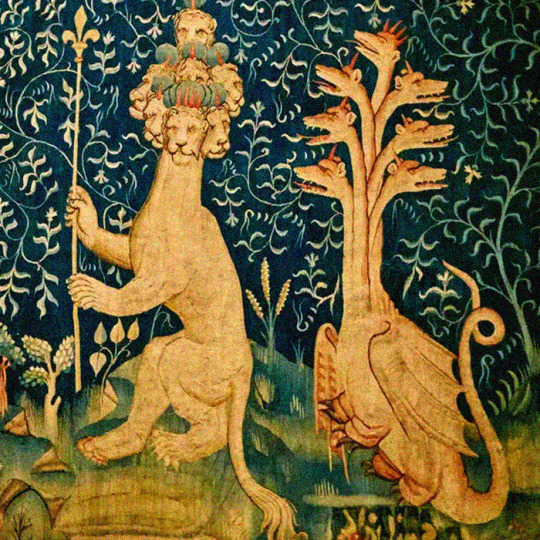
apocalyptical beasts from the book of revelation
3K notes
·
View notes
Text
In light of the info about the properties of souls in The Unwanted Guest, I want to shout out that Gideon — with no grounding in the theoretical underpinnings of the subject whatsoever — actually makes basically the same observation about the permeability of the soul at the end of Harrow the Ninth, when she's in Harrow's body and (with some justification) is pretty sure she's about to die in the River:
Harrowhark, did you know that if you die by drowning, apparently your whole life flashes in front of your eyes? I didn't know, as I died and took you along with me—having kept you alive for what, a whole two hours?—whether it was going to show me both. Like, at the end of everything, if it was going to be you and me, layered over each other as we always were. A final blurring of the edges between us, like water spilt over ink outlines. Melted steel. Mingled blood. Harrowhark-and-Gideon, Gideon-and-Harrowhark at last.
‘As we always were’! ‘Melted steel, mingled blood’! (Also interesting that despite saying earlier in the book that all she ever wanted was for Harrow to eat her (oh Gideon), the metaphors Gideon reaches for here are not about consumption ala what Ianthe’s deal and thus traditional lyctorhood is presented as in TUG, it’s about similar and equal substances joining together to a new whole, more like what we see with Paul. I personally feel like a Paul-style merging for Harrow and Gideon is not in the cards and would not be a satisfying ending — it worked as a bittersweet conclusion specifically for Pal and Cam because those two are utterly nuts in all their sanity lol, but I don’t think the series means to present it as The definitive answer to the central question of individuation vs. connection. There is something so moving to me, though, in the fact that right at the end this is what Gideon wants for her and Harrow. Not for Harrow to eat her, not simply to be of use to her, but to be made together from the same stuff. It’s a longing for connection and union that’s finally at least in imagery free from the imbalance within the ultimately hierarchical roles of necromancer and cavalier that Gideon internalizes through her corruption arc in Gideon the Ninth, understandably so as it’s the only model she’s presented with in their society to understand intimacy and attachment and devotion through. But Gideon says Harrowhark-and-Gideon, Gideon-and-Harrowhark at last, mutually and equally. And I’ve written about this before, but at what must be almost exactly the same time, the same process is happening in Harrow’s mind through the evolution in the symbolism of her dream bubbles. Help I am emotions now)
Palamedes is so right, Gideon is a lot smarter than most people -- including Gideon herself -- ever give her credit for.
#the locked tomb#griddlehark#the unwanted guest#the unwanted guest spoilers#the locked tomb spoilers#tlt spoilers#tug spoilers#gideon nav#harrowhark nonagesimus#harrow the ninth#the locked tomb meta#hope I got all the spoiler tags shout at me if I missed something lol#(tbh I didn’t even realize at first that the soul thing was supposed to be a new revelation in the short story#rather than a confirmation of what we already knew#because Gideon had all but spelled it out one whole book ago fhdskjafsh#insert ‘why am I gasping I already knew that’ barbie meme but like in the opposite direction here)#tlt meta
712 notes
·
View notes
Text
Underrated element of where Jiang Cheng is re: wwx after everything is that they always had a sort of dual relationship. Two different relationship premises, superimposed on one another.
There's the one where they grew up together, as close as brothers, beating each other up and complaining and being one another's closest companions, sharing a bedroom as kids and eating at the same family dinner table, actively encouraged by Jiang Fengmian to interact as equals.
And then there's the one where Wei Wuxian was in service to Jiang Cheng's family. Not as a servant--Jiang Fengmian absolutely refused to do that, even if he couldn't adopt him. But as a disciple of Jiang Cheng's father and recipient of his charity, as Jiang Cheng's future right hand and most trusted subordinate.
It's a vertical relationship, intimate in its own way but with very strict expectations about what obligations flow in what directions; they are not identical and reciprocal as between friends and equals.
(It's my opinion that Jiang Fengmian's core deal was a deep-seated discontent with the hierarchies he was at the top of, without access to any way to actually deconstruct them or even coherently articulate his opposition. Wei Changze was his dear friend, and no one thinks that's a good enough reason for him to treat Wei Changze's son like his own, because Wei Changze was also his servant, and you can't make that circle square. That's not a way you're allowed to love.)
Jiang Cheng and Wei Wuxian were like brothers; Wei Wuxian served Jiang Cheng.
The personal relationship was always the most important one. To them, in their hearts. But it was the other one that was real, that had weight in the world.
And it's important to understand that neither can be held up as more factual than the other, even though they conflict. Both relationships existed, and had power.
So then when Jiang Cheng chose to hate Wei Wuxian and articulate his grudge against him, he chose to do it in the language of fealty. Because as far as he knew, his case there was secure, watertight, and it wouldn't expose him emotionally or politically.
And those are the terms in which he's been condemning him all this time: for abandoning the Sect, for ingratitude, for lack of loyalty.
For fuckups, too, and poor judgment, but some of that now turns out to have been justified and some of it was mostly the fault of enemies behaving badly, or even Jiang Cheng himself allowing himself to be pushed into making unworthy choices.
And it was all for his sake.
The thing, the thing in my opinion, about what Wei Wuxian did, about the core transfer and his silent self-destruction around keeping it secret, is that that is a hideous thing to have done between two people who love each other, as an act of love. Beautiful, but awful. As the man who was like a brother to him, Jiang Cheng has a great deal of standing to object to it.
But as an act of vassalage, it's basically perfect.
If Wei Wuxian were only what he formally was to Jiang Cheng, if he is interpreted through a lens of fealty and obligation, he did exactly what he should have done, and went beyond what duty actually required. And went to his death silently, allowing himself to be judged, taking all the burden on himself rather than let harm come to his lord.
Like, obviously Jiang Cheng was harmed by the part where Jin Zixuan got manslaughtered and Jiang Yanli walked into the line of fire in situations where Wei Wuxian was resorting to violence and probably shouldn't have, but those are one step removed from the core issue. In terms of Wei Wuxian's intentional choices around Jiang Cheng himself, at the times he was feeling betrayed and abandoned Wei Wuxian was in fact being impossibly, poetically loyal, an absolute cliche about it.
But only in terms of the hierarchical form of their relationship.
Which means that even though Jiang Cheng has a lot of reasons to still be mad at Wei Wuxian, his actual complaints that he's centered for thirteen years are basically wiped out by the revelation of Wei Wuxian's sacrifice.
Wei Wuxian was in fact doing the tragic hero loyal vassal thing, which very much includes being misunderstood and slandered by the world. (Chenqing as a name choice absolutely references this expectation, and the idea that Jiang Cheng specifically will never understand that Wei Wuxian was trying to help him first and foremost all along; he is not subtle.)
The debts Jiang Cheng has been spitefully calling in and considering defaulted were already long paid.
So if at this point Jiang Cheng keeps pursuing that same line of rhetorical attack, now that he knows, he'll be putting himself morally in the wrong, and he knows it. But if he pivots to something else, he'll both be signalling the shape of that secret to the entire world and looking like a prize idiot.
Which is already how he feels.
To actually address the remaining grievances between them, which are considerable, would require releasing those safe, open grudges to Wei Wuxian's face and then reclaiming him as a loved one. Which is, one could fairly say, more than anyone could expect.
Which is why Wei Wuxian told him he didn't have to.
Which leaves Jiang Cheng at something of an impasse.
#hoc est meum#jiang cheng#wei wuxian#mdzs#meta#their vertical relationship was always the secure one#the one they could put into words#the one Jiang Cheng could COUNT on#and it's gone and it's what destroyed everything between them#the other relationship could be salvaged in some form#but jiang cheng would have to WANT to#and ofc he does but does he want it enough to choose to?#when wei wuxian isn't choosing him?#and ofc wwx doesn't feel jiang cheng is his to choose#the timing of the revelation is so ironic because imo#wwx spends a lot of the book processing his grief for himself#and the life he had before#and his relationship with jiang cheng#and he let it go and accepted he could never have it back after the debacle at Lotus Pier#only for jiang cheng to be forced to reexamine everything basically immediately lmao#but like wwx is not in a place where he can meet you halfway anymore jiang wanyin#he JUST got closure#it's too soon to go cutting open scars on a man who never lets himself grieve if he can help it#because if you grieve you stop and when you stop you die
1K notes
·
View notes
Text
ironically reflecting the stories' philosophical differences movie arwen & movie chani are both given onscreen agency that they did not have in the books by playing precisely inverse narrative roles that are yet equally integral to the externalization of plot and theme in their respective films in this essay i will
#listen to me listeeeeeeeen#i was already having revelations abt lotr and then dune happened. mashallah i love when romantic relationships are adapted to screen#with unparalleled narrative and thematic Genius#arwen takes the role of book aragorns certainty while chani takes the role of book pauls conflict. by the way#phil.txt#dune#lord of the rings#chani kynes#arwen undomiel#chani x paul#arwen x aragorn
177 notes
·
View notes
Text
why didnt anyone tell me that marius pontmercy is the stupidest person ever
343 notes
·
View notes
Text

William Blake - The Number of the Beast is 666, c. 1805-1810
#william blake#the number of the beast is 666#the final red dragon#biblical horror#book of revelation#occult art#esoteric art#art#painting
248 notes
·
View notes
Link
#Preterism, #
#book-of-revelation#daniel-12#death#eschatology#everlasting-destruction#everlasting-life#life-after-death#matthew-25-41#preterism
0 notes
Text
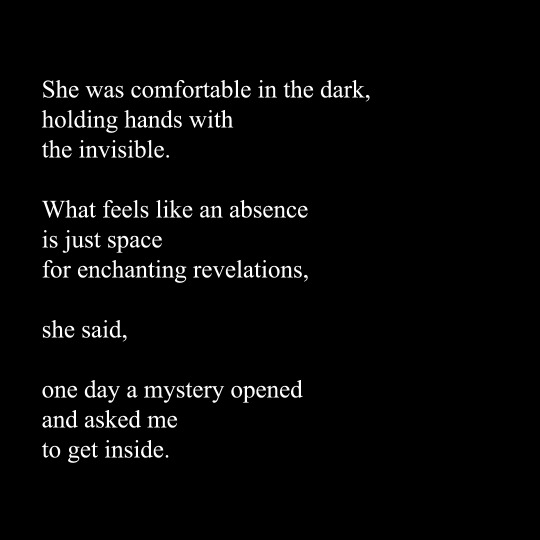
This one was inspired by a dream I had.
3K notes
·
View notes
Text
listen up freaks, I will enjoy my interpretations of Dracula as a truly monstrous creature representing disease and abuse and terror AND as a cunning, drop-dead gorgeous, bitchy sex god
#you cannot make me choose#sometimes you wanna revel in the truly evil nature of the source material#and sometimes you just gotta say to hell with 100% book accuracy#i wanna fuck that evil old vampire#(especially when he’s played by bela lugosi/christopher lee/claes bang)#i go both ways#sue me i’m bi#all art is subjective#dracula#count dracula#bbc dracula#dracula 1931#dracula 2020#dracula bbc#dracula daily#dracula netflix#netflix dracula#re: dracula#bram stocker's dracula#renfield#the last voyage of the demeter#bela lugosi#claes bang#claes kasper bang#vampires#vampire
241 notes
·
View notes
Text
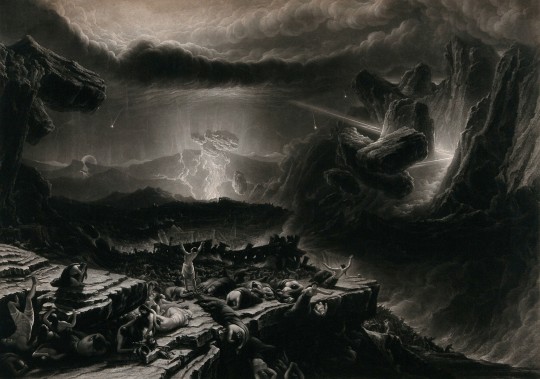
#art#etching#the bible#the book of revelation#the apocalypse#the opening of the sixth seal 1844#g.h. phillips#francis danby#mezzotint#john martin#illustration
208 notes
·
View notes
Text

and they had a king over them, which is the angel of the bottomless pit, whose name in the Hebrew tongue is Abaddon, but in the Greek tongue hath his name Apollyon
80 notes
·
View notes
Text
Behold, I stand at the door, and knock: if any man hear my voice, and open the door, I will come in to him, and will sup with him, and he with me. -Rev 3:20
130 notes
·
View notes